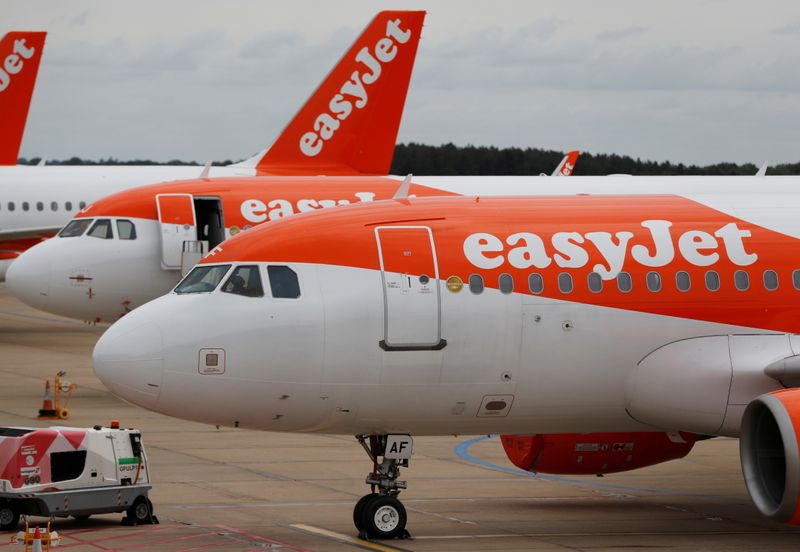By Sarah Young
LONDON (Reuters) -European travel is reviving and easyJet (LON:EZJ) is increasing flights between now and December, the British airline said on Tuesday, after running up an annual loss of over 1 billion pounds during the pandemic.
For the autumn period, easyJet said that it would fly 70% of its pre-pandemic capacity, a jump from the 60% it had been aiming for only a month earlier, as demand for holidays surged, particularly in the UK where travel rules have been loosened.
Winter sun destinations such as Egypt, Turkey and the Canary Islands were popular, business travellers were returning to the skies, and easyJet's chief executive said that capacity would keep growing over 2022.
"It is clear recovery is underway," CEO Johan Lundgren said on Tuesday.
The brighter outlook represents a turnaround from the last year when pandemic uncertainty and travel bans pushed easyJet to an expected headline loss of between 1.135 billion pounds ($1.54 billion)and 1.175 billion pounds for the 12 months to the end of September.
The results, due to be confirmed on Nov. 30, will in the best case scenario beat a consensus forecast for a loss of 1.175 billion pounds.
Shares in easyJet fell 1.5% to 638 pence by 0900 GMT, which Goodbody analyst Mark Simpson said reflected the sense that some investors could be worrying about the broader economic situation for consumers.
"I still believe that the demand picture is there for summer 2022," Simpson said.
Seeking to boost its finances following the pandemic hit, easyJet in September launched a surprise 1.2 billion pound rights issue and also revealed it had rejected an "opportunistic" bid from an unnamed suitor, believed to be rival Wizz Air.
Lundgren said that while M&A was something that all chief executives look at, easyJet was focused on organic growth.
"On a standalone basis, we've been very confident about where we are," he told reporters.
Despite the improved outlook, easyJet cautioned that customers were booking closer to their travel date, meaning it could not provide guidance for 2022. It is not recommending a dividend for 2021.
EasyJet's exposure to the UK, usually about half of its business with the European Union the other half, hurt it this year as Britain has kept stricter travel rules for longer, putting its recovery slightly behind Europe's biggest airline Ryanair.

But Britain has recently relaxed those rules, scrapping some tests and its frequently changing traffic light system which deterred bookings. EasyJet said that the recent changes were helping booking momentum.
($1 = 0.7355 pounds)